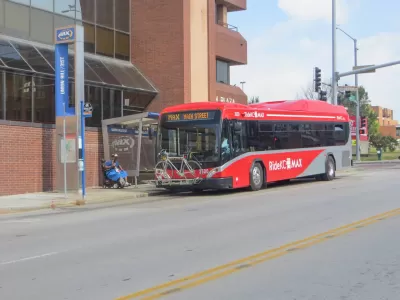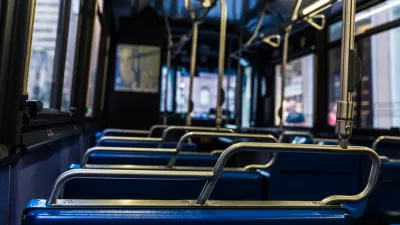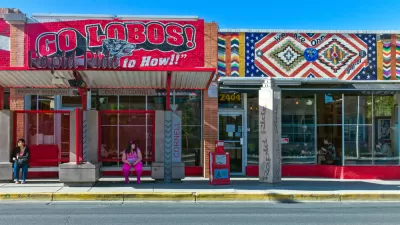Opinion: The movement toward fare-free transit might have more to do with optics and politics than planning.

Washington, D.C. is the latest U.S. city to eliminate fares for public transit riders, after a vote by the D.C. Council on December 6. Connecticut, Seattle, Atlanta, Boulder, and Tucson are among the locations that have extended, implemented, or explored forms of fare-free transit programs in the second half of the calendar year. They follow a host of agencies that launched fare-free transit during the pandemic.
While more evidence of the ridership benefits of fare-free transit emerges along with these new programs (a statewide fare-free program in Colorado boosted ridership during the summer months, for example), it’s a good time for a regularly scheduled reminder that free transit often comes at the cost of improved transit service.
At some point during the pandemic, the transit planning trend du jour became eliminating fares for some or all ridership groups—such programmatic changes far outpacing other potential transit improvements, such as improved stop facilities, protected bus lanes or other street reconfigurations, and increased service levels. It's unclear when the field of planning decided that fare-free transit was the best route to transit success, but that’s the way we are headed.
There are certainly reasons to pause before smashing the fare-free button. Jerusalem Demsas, for example, makes that argument in a recent (paywalled) article for the Atlantic titled “Buses Shouldn’t Be Free.”
Fare-free transit sounds great in theory, but American bus networks are far behind global leaders in offering good service. Focusing on zero-dollar rides is like overseeing a library system stocked solely with out-of-date self-help books in crumbling buildings and wondering if a fresh coat of paint will improve morale.
An article by Peggy Lowe, Ian Duncan, and Justin George for the Washington Post shares the opinions of bus riders around the Washington, D.C. area who admit the savings on fares are appreciated, but perhaps more appreciated would be buses that come more often and get to where there going faster and more efficiently.
While [Tammy] Ward said she likes the financial savings of the free ridership plan, she wishes she could count on the bus to get her to work on time or across the city for shopping or visiting relatives.
The arguments in these two articles are not new—though there are new case studies of agencies and jurisdictions not heeding their warnings. Jarret Walker, one of the nation’s leading consultant on service design and system redesign, has argued a preference for system improvements over fare-free programs, most recently making the Planetizen news feed for this view in 2021. Steven Polzin explained the fiscal impacts of fare reduction programs in a tour de force blog post in 2018.
Washington, D.C. is now the most populous city with fare-free transit in the country (ahead of Kansas City, and Los Angeles’s fare-free transit is currently defunct), and the Washington Post article implies that D.C.’s new program could influence other cities to follow suit.
The remaining question: What’s more beneficial to transit riders—reduced fares or improved transit? It’s important to ask these kinds of questions, but it’s unclear if many cities are. In fact—it’s reasonable to suspect that the reason fare-free transit is so popular is that it avoids hard conversations with the dominant political power when it comes to the use of the public realm in these cities—car drivers. Fare-free transit is happening “behind closed doors”—out of view of the car drivers rushing past as bus riders line up to get onto buses. New bumpouts, protected bus lanes, or signal prioritization—the tools of improved transit service—are much more conspicuous and much more likely to provoke the ire of a gadfly or even a politician.
While there is a good argument to be made for fare-free transit as a tool of equity—especially after seeing transit ridership patters shift to essential workers and low-income communities during and after the pandemic—some of the advocates and sources contributing to these articles in Planetizen, the Washington Post, and the Atlantic are suggesting that equity would be better served by better service.
Like so many other issues, and especially questions of equity, the answer are not as convenient as we might hope.

Planetizen Federal Action Tracker
A weekly monitor of how Trump’s orders and actions are impacting planners and planning in America.

Chicago’s Ghost Rails
Just beneath the surface of the modern city lie the remnants of its expansive early 20th-century streetcar system.

San Antonio and Austin are Fusing Into one Massive Megaregion
The region spanning the two central Texas cities is growing fast, posing challenges for local infrastructure and water supplies.

Since Zion's Shuttles Went Electric “The Smog is Gone”
Visitors to Zion National Park can enjoy the canyon via the nation’s first fully electric park shuttle system.

Trump Distributing DOT Safety Funds at 1/10 Rate of Biden
Funds for Safe Streets and other transportation safety and equity programs are being held up by administrative reviews and conflicts with the Trump administration’s priorities.

German Cities Subsidize Taxis for Women Amid Wave of Violence
Free or low-cost taxi rides can help women navigate cities more safely, but critics say the programs don't address the root causes of violence against women.
Urban Design for Planners 1: Software Tools
This six-course series explores essential urban design concepts using open source software and equips planners with the tools they need to participate fully in the urban design process.
Planning for Universal Design
Learn the tools for implementing Universal Design in planning regulations.
planning NEXT
Appalachian Highlands Housing Partners
Mpact (founded as Rail~Volution)
City of Camden Redevelopment Agency
City of Astoria
City of Portland
City of Laramie






























